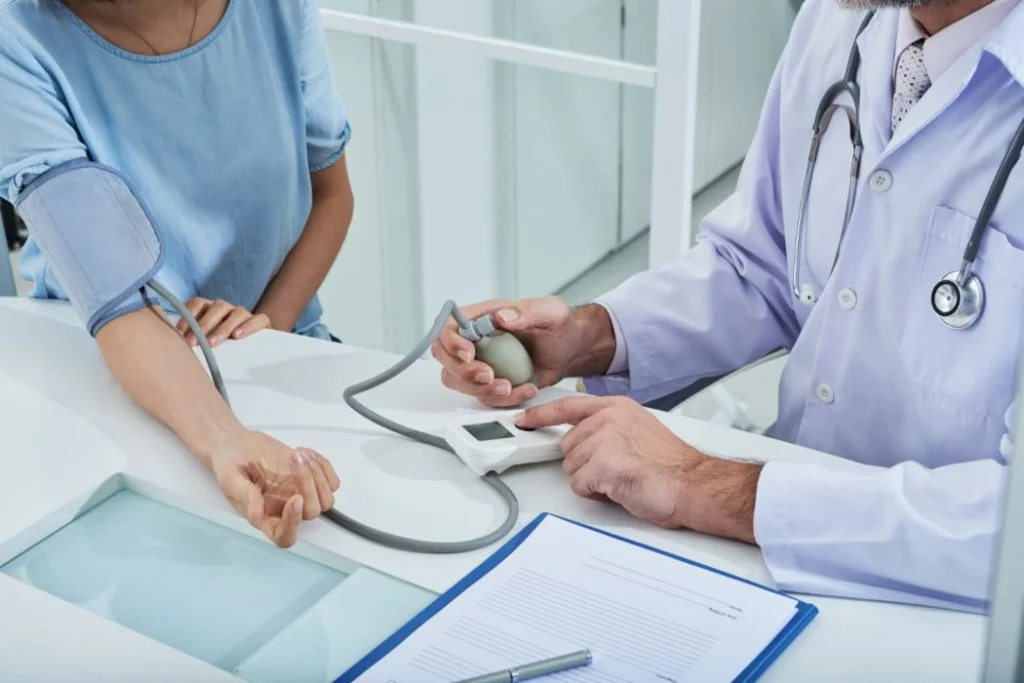Hypertension which is also referred as the silent killer, is a health condition of high blood pressure, affecting you quietly and causing damage before you even realise it’s there. It occurs when there is a higher pressure of blood flowing through your arteries for a long time. Over time, due to constant pressure, a strain is applied to different organs of the body, such as the kidneys, heart, blood vessels, etc. The most concerning part is that hypertension usually doesn’t show clear symptoms or warning signs, which is why doctors often call it a “silent killer”. Millions of people around the world are affected by this disease, and many don’t even realise that they have it until it leads to something more serious like a heart attack.

Types of Hypertension
Hypertension usually has two main types:
- Primary (Essential) Hypertension
Primary hypertension is the most common form and spreads gradually over many years. There are combinations of different causes behind it, such as genetics, lifestyle habits, and age. - Secondary Hypertension
Secondary hypertension is less common but appears suddenly. It develops when you already have certain medical conditions, such as kidney disease, hormonal issues, or side effects from certain medications. When the underlying problem is treated, secondary hypertension can be improved or cured properly.
Symptoms of Hypertension
One of the scariest things about hypertension is that, at early stages, it doesn’t show obvious symptoms. Some people spend years of their life without knowing that their blood pressure is high. Symptoms that start appearing at a certain point include:
- Frequent headaches
- Dizziness or feeling lightheaded
- Shortness of breath
- Blurry vision
- Chest pain
- Irregular heartbeats
Nosebleeds (though that is a rare symptom)
Because these symptoms can be caused by many different health conditions, the only reliable way to know if you have hypertension is to check your blood pressure on a regular basis.
Causes
The reasons that cause hypertension vary from person to person. However, common causes include:
- Consuming too much salt and processed food
- overweight or obesity
- Lack of physical activity
- Use of excessive alcohol or smoking
- Taking stress over long periods
- Family history of hypertension
- Old age (blood vessels naturally become stiffer with growing age)
- Other health conditions such as diabetes or kidney disease
Risk Factors
Certain people are at higher risk of developing this disease because of their lifestyle, family history regarding this disease, or other existing health conditions. Some of the major risk factors include:
- Age: The risk gets high as people start getting older.
- Genetics: If close family members (parent or sibling) have a history with hypertension, chances are higher.
- Race: According to research, people of African descent tend to develop hypertension earlier and more severely than others.
- Unhealthy habits: Smoking, drinking too much alcohol, and eating salty or fatty foods all develop the risks of this disease.
- Chronic conditions: Chronic health conditions like diabetes, obesity, and high cholesterol raise the risk further.
- Stress: Constantly living under stress without proper management strategies can also drive blood pressure up
Complications
Leaving hypertension without any treatment is like leaving a fire smouldering—it may not look dangerous at the start, but eventually, it can cause damage on a larger scale. Most serious complications include:
- Heart attack or stroke: Arteries can be damaged by high pressure, which can make them clog or more likely to burst.
- Heart failure: Due to excess pressure on the heart, it gets overworked, which makes it weaker with time.
- Kidney disease: Hypertension can leave scars and sometimes damage kidney tissue, which leads to kidney failure.
- Vision problems: You can lose your vision, as high blood pressure may damage blood vessels of the eyes.
- Cognitive decline: If high blood pressure is not controlled on time, it can increase the risk of memory problems and dementia later in life.
Diagnosis
Diagnosis of hypertension is easy, as checking blood pressure on a daily basis is fast, simple, and painless. It is measured by using two numbers:
- Systolic pressure (top number): Measuring the force when the heart pumps.
- Diastolic pressure (bottom number): Measuring the force when the heart rests between two beats.
A normal reading of blood pressure is around 120/80 mmHg. When readings are consistently 130/80 mmHg or higher, hypertension is confirmed.
Doctors may use different methods to diagnose hypertension, such as
- Regular visits to the clinic for check-ups
- 24-hour blood pressure monitoring (ambulatory test)
- Blood and urine tests to eliminate underlying problems
- An ECG or echocardiogram to check for heart damage
Cure and Prevention
Hypertension cannot always be completely cured; however, it can always be controlled. People can lower their blood pressure and reduce the risk of complications by taking the right steps.
Lifestyle Changes
- Eat smart: Following a healthy and balanced diet, which focuses on fruits, vegetables, whole grains, and less salt, can make a huge difference.
- Stay active: Adding a physical activity like 30 minutes of walking, jogging, or other exercise helps the heart and blood vessels to stay healthy.
- Lose excess weight: Blood pressure can be lower even by a small amount of weight loss.
- Cut back on alcohol and quit smoking: Both alcohol and smoking cause high blood levels and damage blood vessels.
- Manage stress: Activities to manage stress like meditation, yoga, or even simple breathing exercises are useful.
Medical Treatment
When changes in your lifestyle are not making any difference, then doctors may prescribe
some medication.
- Diuretics to reduce excesses of body fluid.
- Beta-blockers to slow your heart rate
- ACE inhibitors or ARBs used to relax blood vessels
- Calcium channel blockers prevent arteries from becoming stiff.
The doctor will prescribe medicines depending on the individual’s health and other medical conditions.